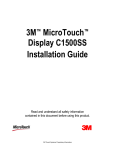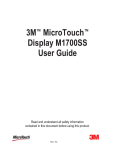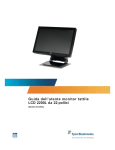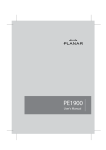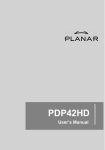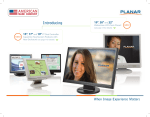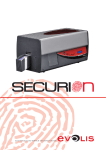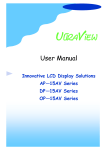Download Product Manual
Transcript
The information contained in this document is subject to change without notice. This document contains proprietary information that is protected by copyright. All rights are reserved. No part of this document may be reproduced, translated to another language or stored in a retrieval system, or transmitted by any means, electronic, mechanical, photocopying, recording, or otherwise, without prior written permission. Windows is a registered trademark of Microsoft, Inc. Other brand or product names are trademarks of their respective holders. Table of Contents Usage Notice Precautions . . . . . . . . . . . . . . . . . . . . . . . . . . . . . . . . . . . . . . . . . . . . . . 1 Introduction About the Product . . . . . . . . . . . . . . . . . . . . . . . . . . . . . . . . . . . . . . . . . 2 Package Overview . . . . . . . . . . . . . . . . . . . . . . . . . . . . . . . .. . . . . . . . . 5 Installation Product Overview . . . . . . . . . . . . . . . . . . . . . . . . . . . . . . . . . . . . . . . . . 6 User Controls Front Panel Controls . . . . . . . . . . . . . . . . . . . . . . . . . . . . . . . . . . . . . . . 14 How to Use the OSD Menus . . . . . . . . . . . . . . . . . . . . . . . . . . . . . . . . . 15 On-Screen Display Menus . . . . . . . . . . . . . . . . . . . . . . . . . .. . . . . . . . . 16 Appendix Troubleshooting . . . . . . . . . . . . . . . . . . . . . . . . . . . . . . . . . . . . . . . Warning Signal . . . . . . . . . . . . . . . . . . . . . . . . . . . . . . .. . . . . . . . . . Product Dimensions . . . . . . . . . . . . . . . . . . . . . . . . . . . . . . . . . . . . Monitor Specifications . . . . . . . . . . . . . . . . . . . . . . . . . . . . . . . . . . . Video Modes . . . . . . . . . . . . . . . . . . . . . . . . . . . . . . . . . . . . . . . . . . Touch Screen Driver Installation . . . . . . . . . . . . . . . . . . . . . . . . . . . . . . . . . . . . . . . . . . . . . 19 20 21 22 23 24 Usage Notice WARNING - To prevent the risk of fire or shock hazards, do not expose this product to rain or moisture. WARNING - Please do not open or disassemble the product as this may cause electric shock. Safety and Use Precautions Follow all warnings, precautions and maintenance as recommended in this User’s Guide to maximize the life of your unit. Do: Turn off the product before cleaning. Use only a dry soft cloth or clean room wiper when cleaning the LCD panel surface. Use only high quality and safety approved AC/DC power adapter. Disconnect the power plug from AC outlet if the product is not used for a long period of time. Don’t: Do not touch the LCD panel surface with sharp or hard objects. Do not use abrasive cleaners, waxes or solvents for cleaning. Do not operate the product under the following conditions: - Extremely hot, cold or humid environment. - Areas susceptible to excessive dust and dirt. - Near any appliance generating a strong magnetic field. - Place in direct sunlight. 1 Introduction About Planar’s PT1500M(U), PT1501M(U) The PT15” products all have a 15” flat panel screen with an active matrix, thin-flim transistor (TFT), liquid crystal display (LCD). Features include: Direct analog signal input Active matrix TFT LCD technology 1024 x 768 XGA resolution 15” viewable display area 31.5 ~ 60 kHz horizontal scan 56 ~ 75 Hz refresh rate Auto-adjustment function Multilingual OSD user controls VESA DPMS power saving Kensingston security lock slot 75 mm VESA mount Durable touchscreen 2 Touch Screen for PT1500M(U) Resistive for finger and pen interface Surface : Anti-glare treatment Interface : Serial (PT1500M), USB (PT1500MU) Durability : 1,000,000 activations at a single point Hardness of surface : 4H per ASTM D3363-92 Operating force : Stylus - <25 g (average) Finger - <50 g (average) Transmissivity : 85% + / - 2% (typical) Haze : 5% Clarity : 80% Driver : Windows 95/98/Me/NT/2000/XP, Linux 3 Touch Screen for PT1501M(U) Capacitive for finger interface Surface : Anti-glare treatment Interface : Serial (PT1501M), USB (PT1501MU) Durability : 225,000,000 touches in a single location Hardness : Cannot be scratched using any stylus with Mohs' rating of less than 6.5 Transmissivity : up to 88% at 550 nm Driver : Windows 95/98/Me/NT/2000/XP, Linux MS HID compatible pointing device 4 Package Overview LCD Display VGA Signal Cable User’s Guide Power Adapter Power Cord Audio-In Cable RS-232 Serial Cable (for PT1500M, PT1501M) Landing Strip USB Cable (for PT1500MU, PT1501MU) Touchscreen Driver Installation CD-ROM 5 Installation Product Overview Front View LCD Display Panel Controls Speakers Stand Rear View Connector Ports “A” (Inside the back cover) Connector Ports “B” 6 Connector Ports “A” DC Power-In VGA input Audio input Connector Ports “B” RS-232 (For PT1500M, PT1501M) USB (For PT1500MU, PT1501MU) Touch Function 7 Kensington Security Slot The monitor can be secured to your desk or any other fixed object with Kensington lock security products. The kensington lock is not included. Kensington Security Slot 8 VESA Mount your monitor This monitor conforms to the VESA Flat Panel Mounting Physical Mounting Interface Standard which defines a physical mounting interface for flat panel monitors, and corresponding standards for flat panel monitor mounting devices, such as wall and table arms.The VESA mounting interface is located on the back of your monitor. To mount the monitor on a swing arm or other mounting fixture, follow the instruction included with the mounting fixture to be used. Slots 75mm VESA Mounting Interface 75mm Note! Please select the proper screws! The distance between the back cover surface and the bottom of the screw hole is 8mm. Please use a M4 screw. 9 Start your Installation Remove the Back Cover Please follow these instructions to remove the cover on the back panel of the LCD so that you can connect the cables in ”Connector Ports B.” A Back Cover 1. To remove the back cover, follow the arrows in Figure A and press with both your thumbs. The cover should be removed by pressing firmly. 2. Follow the instruction on P.12 (Figure 11.1) to connect the cables in ”Connector Ports B.” 3. Fix the cover back to the LCD. You may also keep the cables in order with the included cable organizer. Included Cable Organizer Note! You can place the LCD flat horizontally to make it easier to connect the cables. Please make sure that you place it on an even surface lest the LCD should be damaged by scratches or collision. 10 Connecting the Display (Figure 11.1, 11.2) Figure 11.2 needs to added for the USB port connection. To setup this display, please refer to the following figure and procedures. 1. Be sure the computer and monitor are turned off. 2. Connect the DC power cord to the power connector; plug one end of the AC power cord into the power adapter, and then the other end into an electrical outlet (11.1) 3. Connect the VGA signal cable from the display’s VGA input connector to the 15-pin connector of your host computer and tighten the screws (11.1). 4. Connect the Audio-In cable from the audio input port of your display to the 5. For the PT1500M and the PT1501M, connect the RS-232 cable from the Audio-out port of your computer (11.1). RS-232 port of your display to the RS-232 port of your computer (11.1). 6. For the PT1500MU and the PT1501MU, connect the USB cable from the USB port of your display to the USB port of your computer (11.2). Notice! To ensure the LCD display works well with your computer, please configure the display mode of your graphic card to make it less than or equal to 1024 x 768 resolution and make sure the timing of the display mode is compatible with the LCD display. We have listed the “Video Modes” of this LCD display in the appendix for your reference. 11 Figure 11.1 Audio-In Cable VGA Cable Power Adapter & Power Cord 12 RS-232 Cable Figure 11.2 Audio-In Cable VGA Cable Power Adapter & Power Cord 13 USB Cable User Controls Front Panel Controls AUTO MENU SELECT No./ Icon Control Function MENU Menu button Display the OSD menus SELECT/AUTO Select/Auto Select- To select the adjustment items from OSD menus. Auto- To activate the “Auto Adjustment” function to obtain an optimum image. 3 Brightness Minus/ Minus 1.Decreases the brightness of the display image. 2.Decreases value of the adjustment items. 4 Brightness Plus/ Plus 1.Increases the brightness of the display image. 2.Increases value of the adjustment items. Power Switch Switches on/off the power of the LCD display. Power LED 1.Green indicates the display is turned on. 2. Amber indicates the display is in power-saving mode. 14 How to Use the OSD Menus 1. Press the “Menu” button to pop up the on-screen menu and to select between the four Main Menus. 2. Choose the adjustment items by pressing the “Select/Auto” button. 3. Adjust the value of the adjustment items by pressing the “3” or “4” button. 4. The OSD menu will automatically close, if you have left it idle for a pre-set time. 15 On-Screen Display Menus Main OSD Menu: 4 Brightness Choose this function to adjust the brightness of the image. 4 Contrast Choose this function to adjust the contrast ofthe image. 4 LCD Adjustment Opens the LCD Adjustment sub-menu where you can adjust the Clock, Phase, Horizontal Position and Vertical Position parameters. 4 Color Temperature Opens the Color Temperature sub-menu where you can select the desired Color Temperature of the image. 4 ECO Mode Enables or disables the power savings mode. 4 Language Opens the Language sub-menu where you can select the desired language of the OSD. 4 Other Setup Opens the Other Setup sub-menu where you can adjust the Smooth, OSD Position, OSD Transparency, OSD Time Out, Volume and Mode Message parameters. 16 LCD Adjustment Sub-Menu: 4 Clock Minimizes any vertical bars or stripes visible on the screen. 4 Phase Minimizes any horizontal distortion and clears or sharpens the displayed characters. 4 H. Position Changes the horizontal position of the image. 4 V. Position Changes the vertical position of the image. 17 Other Setup Sub-Menu: 4 Smooth Adjusts the smoothness of the image. 4 OSD H. Position Changes the horizontal position of the OSD. 4 OSD V. Position Changes the vertical position of the OSD. 4 OSD Transparency Changes the opaqueness of the OSD background. 4 OSD Time out Adjusts the amount of time the OSD menu will be displayed for after inactivity. 4 Volume Adjusts the sound volume. 4 Mode Message Enables or disables the display of information. 4 Reset Resets the display parameters back to its factory default settings. 18 Appendix Troubleshooting If you are experiencing trouble with the LCD display, refer to the following. If the problem persists, please contact your local dealer or our service center. Problem: No image appears on screen. 4 Check that all the I/O and power connectors are correctly and well connected as described in the “ Installation ” section. 4 Make sure the pins of the connectors are not crooked or broken. Problem: Partial image or incorrectly displayed the image. 4 Check to see if the resolution of your computer is higher than that of the LCD display. 4 Reconfigure the resolution of your computer to make it less than or equal to 1024 x 768. Problem: Image has flickering vertical line bars. 4 Use “ Clock ” to make an adjustment. 4 Check and reconfigure the display mode of the vertical refresh rate of your graphic card to make it compatible with the LCD display. Problem: Image is unstable and flickering 4 Use “ Phase ” to make an adjustment. Problem: Image is scrolling 4 Check and make sure the VGA signal cable (or adapter) is well connected. 4 Check and reconfigure the display mode of the vertical refresh rate of your graphic card to make it compatible with the LCD display. Problem: Vague image (characters and graphics) 4 Use “ Clock ” to make an adjustment. If this problem still exists, use “Phase” to make an adjustment. 19 Warning Signal If you see warning messages on your LCD screen, this means that the LCD display cannot receive a clean signal from the computer graphics card. There may be two sources for this problem. Please check the cable connections or contact Planar for more information. 4 No Signal This message means that the LCD display has been powered on but it cannot receive any signal from the computer graphic card. Check all the power switches, power cables, and VGA signal cable. 4 Out of Range This message means that the signal of the computer graphic card is not compatible with the LCD display. When the signal is not included in the “Video Modes” list we have listed in the Appendices of this manual, the LCD display will display this message. 20 Product Dimensions 382.5mm/15.06” 384.3mm/15.1” Front View 56.8mm/2.23” Side View 180.1mm/7.1” Top View 21 Monitor Specifications Item Specification LCD Module 15-in, active matrix TFT, anti-glare coating, 0.297 mm pixel pitch Display Size 304 mm x 228 mm Viewing Angle Left/Right 60/60 left/right Up/Down 40/60 up/down Display Colors 16,777,216 (8bits/color) with FRC Power Input 100 ~ 240 VAC Full Range, 50/60 Hz (External AC adapter) Maximum power consumption <30W (5W Standby) Signal Input Video Signal RGB positive 0.7VPP, 75ohm Sync signals Separate, TTL Level Line (horizontal) frequency 31.5 kHz to 60kHz Raster (vertical) frequency 56 Hz ~ 75 Hz Pixel dot clock 78.75MHz Recommended mode 1024 x 768 @ 60 Hz Pedestal tilt -5 ~ 25 degress Dimensions (W x H x D) 382.5 x 384.3 x 180.1 mm Weight 5.1 kgs Operating Conditions Temperature 50 ~ 350 C / 410 ~ 950F Humidity 80% maximum Altitude 3658m Storage Conditions Temperature -200 ~ 600C / -40 ~ 1400F Humidity 80% maximum Altitude 12,193m 22 Video Modes The monitor supports the following industry-standard combinations of screen resolution and refresh rates. Other combinations are possible, but may require adjustments to the image. For the optimal performance, set your computer to a screen resolution of 1024 x 768 at a 60 Hz refresh rate. Hsync (kHz) Vsync (Hz) 640 x 350 31.5 70 640 x 400 31.5 70 31.5 60 37.9 72 37.5 75 35.2 56 37.9 60 48.1 72 46.9 75 48.4 60 56.5 70 60 75 31.5 70 34.9 67 35 67 832 x 624 49.7 75 1024 x 768 60.2 75 Display Mode VGA 640 x 480 SVGA XGA 800 x 600 1024 x 768 US TEXT 720 x 400 Apple 640 x 480 MAC 23 Touch Screen Driver Installation Driver Installation for PT1500M: Resistive Touch Screen with RS-232 Serial Connection Touch driver information is located on the enclosed CD-ROM for the following operating systems: Microsoft Windows R XP, Windows 2000, Windows NT 4.0, Windows Me, and Windows 9X. 1. Open the CD-Rom. 2. Select the link for your monitor model. 3. The driver file will automatically open. 4. Select the "TW564SR4.exe file. 5. Select "unzip" 6. Double click the "setup.exe" file. 7. Follow the installation instructions. 8. If the touch screen driver does not automatically load, restart the computer operating system. Please read "Readme.txt" located in the unzipped file folder for additional information and assistance. Driver Installation for PT1500MU: Resistive Touch Screen with USB Connection Please note: These monitors are Microsoft Windows R HID (Human Interface Device) compatible. No additional software driver is required for general operation of the touch screen. A special calibration tool can be installed for improved touch position accuracy. See Optional MicroTouchTM USB HID Calibration Tool version 7.00 Installation Process 24 Optional Driver MicroTouchTM USB HID Calibration Tool Version 7.00 Installation Process for PT1500MU: Resistive Touch Screen with USB Connection Please note: These monitors are Microsoft HID (Human Interface Device) compatible. The calibration driver is not required for general operation of the touch screen. This calibration tool is for optimization of touch performance for the touch screen to meet the 1% TPE accuracy specification. The following Microsoft Windows R operating systems are supported by this software driver: Microsoft Windows R 98SE, Me, 2000, and XP. 1. Open the CD-Rom. 2. Select the PT1500MU Calibration Option link. 3. The driver file will automatically open. 4. Follow the installation instructions for the MicroTouch HID Calibration procedure. Please read "Readme.txt" located in the unzipped file folder for additional information and assistance. Driver Installation for PT1501M: Capacitive Touch Screen with RS-232 Serial Connection Touch driver information is located on the enclosed CD-ROM for the following operating systems: Microsoft Windows R XP, Windows 2000, Windows NT 4.0, Windows Me, and Windows 9X. 1. Open the CD-Rom. 2. Select the link for your monitor model. 3. The driver file will automatically open. 4. Select the "TW564SR4.exe" file. 5. Select "unzip" 6. Double click the "setup.exe" file. 25 7. Follow the installation instructions. 8. Reconnect the USB cable 9. If the touch screen driver does not automatically load, restart the computer operating system. Please read "Readme.txt" located in the unzipped file folder for additional information and assistance. Driver Installation for PT1501MU: Capacitive Touch Screen with USB Connection Touch driver information is located on the enclosed CD-ROM for the following operating systems: Microsoft Windows R XP, Windows 2000, Windows NT 4.0, Windows Me, and Windows 9X. If you have a USB cable connection disconnect the cable from the monitor or the PC before installing the driver. 1. Open the CD-Rom. 2. Select the link for your monitor model. 3. The driver will automatically open. 4. Select the "TW564SR4.exe file. 5. Select "unzip" 6. Double click the "setup.exe" file. 7. Follow the installation instructions. 8. Reconnect the USB cable 9. If the touch screen driver does not automatically load, restart the computer operating system. Please read "Readme.txt" located in the unzipped file folder for additional information and assistance. 26 Linux Driver Installation for PT1501MU: Capacitive Touch Screen with USB Connection Touch driver information is located on the enclosed CD-ROM. Supported platforms include: Red Hat R Linux 8.0, Red Hat R Linux 9.0, and SuSE R Linux 8.2 and SuSE R Linux 9.0 on Pentium R -compatible CPUs. The following Xfree86 versions are supported: 4.0.3 and 4.1.0. 1. Open the CD-Rom. 2. Select the "TwLinux5.62.1" folder. 3. Double click the "Readme.txt" file. 4. Follow the driver selection and installation instructions. Please read "Readme.txt" located in the unzipped file folder for additional information and assistance. 27 Planar Systems, Inc. Customer Service Online Support:http://planar.custhelp.com Email:[email protected] Tel:1-866-PLANAR-1 (1-866-752-6271) Hours:m-f, 8am-9pm, Eastern Time ©2004 Planar Systems, Inc. Planar is a registered trademark of Planar Systems, Inc. Other brands and names are the property of their respective owners. Technical information in this document is subject to change without notice. P/N: 36.57709.003 Rev. A































